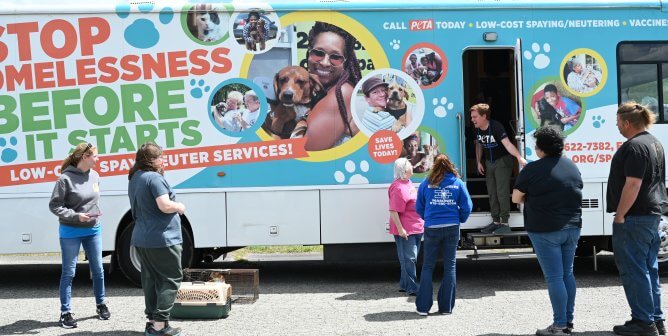Report Card Grades: Environmental Working Group
Report Card Grades » Environmental Working Group » Grade: F
PETA first wrote to the Environmental Working Group (EWG) in 2001 because of its involvement in chemical-testing issues and its calls for increased testing on animals. At that time, we invited the organization to endorse a statement calling on the Environmental Protection Agency (EPA) to increase its funding and use of non-animal testing methods. Not only did EWG refuse to endorse PETA’s statement, in the intervening years it has also gone on to strengthen its support of animal testing and become even more active in advocating for campaigns and legislation that would increase animal use in laboratory experiments.
For example, EWG is a founding member of the Campaign for Safe Cosmetics. This campaign calls on cosmetics manufacturers to test their products for a variety of health effects and would spell suffering and death for hundreds of thousands of animals in laboratories. PETA wrote to EWG in August 2004 to express our concern that it was calling for testing of substances that are already well known and well documented, such as salt, aloe vera gel, chamomile—even phosphoric acid!—and that this campaign could turn into yet another animal testing boondoggle that does nothing to protect the public. PETA—together with other animal, environmental, and health advocacy organizations—subsequently issued a joint letter to EWG and other founding members of the Campaign for Safe Cosmetics asking that the language of the compact be altered to clarify that no animal tests should be conducted. To date, EWG and its partners have refused to change this language. To make matters worse, this campaign runs counter to the worldwide movement to ban the sale of cosmetics—and their ingredients—that have been tested on animals. The European Union, Israel, and India have already successfully passed such laws.
In 2008, EWG attempted to enact legislation—misleadingly named the “Kid Safe Chemicals Act”—that would have resulted in another massive animal-testing program. This plan would have required that chemicals be tested using the most animal-intensive studies known—developmental and reproductive studies—in which thousands of animals are killed in each test and the animals suffer for up to two years. PETA and other animal- and health-protection groups approached EWG with a proposal to alter the wording of the bill to include the development and use of non-animal methods. But after much work and compromise on the part of the animal groups, EWG inexplicably walked away from the discussions.
PETA and others have repeatedly explained to EWG officials, using science, that simply calling for more animal tests will not protect public health or the environment. The animal tests currently used are based on methods that were developed in the 1930s and ’40s. Not only are these tests expensive and time-consuming, they also provide ambiguous results with questionable relevance to human health that cannot be used to regulate dangerous chemicals effectively. Non-animal tests based on our current understanding of biology can give much more reliable and relevant results.
We have shown that the current animal-based testing scheme used by regulatory agencies is simply not working and that it’s critical to switch to a modern, non-animal–based scheme—as was proposed in the 2007 National Academy of Sciences (NAS) report “Toxicity Testing in the 21st Century: A Vision and a Strategy.” An essential feature of this approach is a tiered paradigm, in which a comprehensive array of in vitro (cell culture) methods “provides a stronger, mechanistically based approach for environmental decision-making.” The report goes on to detail the components needed for such a program, the technology and tools required, and how to develop them, and it describes an approach to regulatory decision-making based on this new paradigm. But our attempts to encourage EWG to adopt this approach have consistently been rebuffed.
Also in 2008, in an attempt to appear more animal-friendly, EWG launched a campaign ostensibly to protect “pets” from dangerous chemicals. Unfortunately, the organization was still claiming that animals, including dogs and cats, can predict what will happen to humans. In an odd twist, even this “animal-friendly” campaign called for more toxicity tests (for toys, furniture, and food) on animals!
In 2015, EWG has been extremely vocal in denouncing a bipartisan chemical-testing reform bill called the Frank R. Lautenberg Chemical Safety for the 21st Century Act, which would update the ways in which chemicals are tested and regulated in the U.S. The bill, which follows the principles outlined in the NAS report, encourages cutting-edge non-animal test methods and directs the EPA to consider all the information available on a chemical and similar chemicals before requiring new testing. Animal-protection organizations are working to ensure that non-animal methods will be used preferentially.
Instead of supporting legislation that would modernize chemical testing and reduce animal suffering, EWG was instrumental in introducing a competing bill in March 2015 that removes much of the Lautenberg bill’s language reducing animal tests and adds language that would cause an untold increase in animal suffering.
UPDATE (June 2015): EWG is now at the forefront of advocating for the Personal Care Products Safety Act, which would explicitly allow companies to test cosmetics ingredients on animals as part of a new U.S. Food and Drug Administration “review” process.
What You Can Do
Please let EWG know that chemical testing reform can only truly be achieved if we move away from archaic animal tests and toward more effective, modern non-animal testing, as encouraged by the Lautenberg bill, and that it should support legislation requiring that non-animal tests be used preferentially.
Click here for additional points to include in your letter.
Send letters to:
Ken Cook, President
Environmental Working Group
1436 U St. N.W., Ste. 100
Washington, DC 20009
202-667-6982
202-232-2592 (fax)
[email protected]
If you support any of the organizations below, please be aware that they are also part of the “Campaign for Safe Cosmetics,” which would result in suffering and death for hundreds of thousands of animals in laboratories. They should hear from you as well:
- Alliance for a Healthy Tomorrow
- Breast Cancer Fund
- Clean Water Fund
- Commonweal
- Friends of the Earth
- Health Care Without Harm
- Massachusetts Breast Cancer Coalition
- National Black Environmental Justice Network
- National Environmental Trust
- Women’s Voices for the Earth



